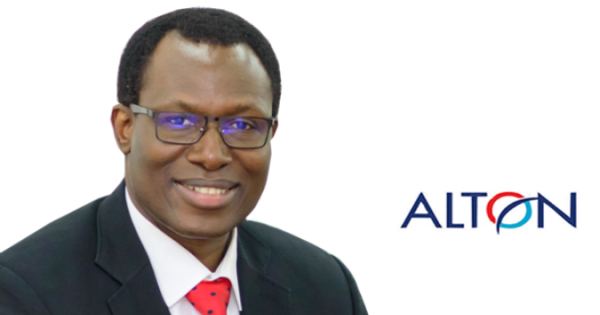Telecom
Telcos May Withdraw Banks’ USSD Service over N42Bn Debt

Telecommunications operators have resolved to start phased withdrawal of its Unstructured Supplementary Service Data (USSD) services to debtor financial services providers from Monday next week.

Gbenga Adebayo
In a statement by Association of Licensed Telecommunications Operators of Nigeria (ALTON) signed by Gbenga Adebayo, its chairman, operators said they are initiating a phased process of withdrawal of USSD services, starting with the most significant debtors within the Financial Service Providers (FSPs) effective Monday March 15, 2021.
“While the withdrawal of USSD service is in place, we encourage our subscribers to kindly explore alternative channels with their Banks”.
However, ALTON expressed its cognisance of the letter issued by the Minister of Communications and Digital Economy to the Central Bank of Nigeria, seeking a resolution to the on-going dispute between the banking sector (Financial Service Providers (FSPs)) and the telecoms sector over the appropriate methodology to use to charge for USSD services.
It would be recalled that in order to accelerate the adoption of financial services on USSD, the Financial Service Providers (FSPs) partnered with telecom operators to zero-rate the USSD access to end-users, while they bore the cost for the provision of service.
Based on this arrangement, the banks took on the responsibility of billing customers and paid operators for use of the USSD infrastructure from the service fees deducted from the customer’s bank account.
Following the issuance of the USSD Pricing determination by the Nigerian Communications Commission (NCC) which resulted in a price review of USSD service by telcos, the banks decided that they would no longer pay for USSD service delivered to their customers and requested our members to charge customers directly for use of the USSD channel.
According to ALTON, “this billing methodology where the Financial Service Providers (FSPs) customer is directly charged USSD access fees by our members irrespective of the service charges that the bank may subsequently apply to the customers’ bank account is called “End-User Billing” which the banks specifically demanded that all our members implement.
“The banks, however, provided no assurances to our members that such service fees charged to customers’ bank accounts for access to bank services through the USSD channel would be discontinued post implementation of end-user billing by our members.
“The removal of these service fees by the Financial Service Providers (FSPs) would have meant that if bank customers were charged only the USSD costs communicated by our members per USSD session, bank customers will be paying far less than what they are currently being charged by the Financial Service Providers (FSPs) which in some instances are as high as N50. Additionally the banks and telcos will be applauded for collaborating towards the financial inclusion objectives of the federal government.
“It has been more than eight (8) months since the Nigerian Communications Commission (NCC) issued an updated pricing methodology for USSD services for financial transactions in Nigeria.
“The methodology explicitly restricts Mobile Network Operators (MNO’s) from charging the end user for the services and mandates the banking sector to enter into negotiations to settle outstanding obligations and agree individual pricing mechanisms to be applied going forwards.
“During this time, Mobile Network Operators (MNO’s) have continued to provide access to USSD infrastructure and our members have continued to pay all Bank charges and fees to access the Banking industries assets and customers, despite the fact that obligations due from banks to telecoms companies for USSD services has reached over Forty-Two Billion (N42B) Naira.”
Telecom operators have continued to provide these services because their primary concern is that the millions of Nigerian customers who access financial services through our USSD infrastructure every day should be able to continue conducting their transactions.
This was given greater importance when customers’ became further reliant on these services due to COVID movement restrictions. Unfortunately, as it has been impossible to agree on a structure for these payments with the banks that do not involve the end-user being asked to pay, the government has been forced to intervene to ensure that a sustainable cost-sharing solution is agreed, that does not disadvantage the consumer in the long-term.
Telecom
Glo Unveils Immersive Gaming Experience, Travel Saga

With the introduction of Travel Saga, a premium, fast-paced gaming experience that is currently live and accessible to customers on its network, Globacom has lifted the bar for mobile entertainment in the country.

Travel Saga is a story-driven, intricately connected role-playing game designed to provide the thrill, complexity, and competitive intensity of some of the most well-known action games in the world.
The game, which has been painstakingly optimized for mobile devices, redefines mobile gaming as a full-fledged digital battlefield by translating a console-grade experience onto data-enabled handsets.
Fundamentally, Travel Saga takes users on quick virtual journeys against recognizable international landscapes. In a dynamic, ever-evolving gaming environment, players are thrown into furious missions, fierce fights, and ever-expanding tales where talent, strategy, and endurance determine who rises through the ranks to become a true war hero.
In addition to the excitement of fighting, users are encouraged to go to various locations, take part in thrilling challenges, and participate in intense competition for in-app rewards like points and victory badges. With each encounter and accomplishment, the immersion increases with each level, maintaining momentum and excitement.
Flexible subscription plans with one-time or auto-renewal choices are available to subscribers for the service, which costs ₦100 per day and ₦250 per week. By dialing *70021#, customers can quickly subscribe and gain instant access to the action.
With Travel Saga, Glo reaffirms its dedication to innovation and high-end digital experiences, making top-notch gaming easily accessible to its customers. The game offers uninterrupted action, adventure, and competition, all smoothly supported by the Glo network.
Telecom
SHELT Named in Prestigious 2025 MSSP 250 List for Cybersecurity Excellence

SHELT, a leading cybersecurity-as-a-service provider, has earned inclusion in the 2025 MSSP 250, the annual ranking of the world’s top 250 Managed Security Service Providers (MSSPs) by MSSP Alert, a CyberRisk Alliance publication.

SHELT
The list evaluates firms on business performance, service breadth, and industry impact, spotlighting those excelling in growth, operational excellence, and advanced managed security amid rising cyber threats. Selection criteria include annual recurring revenue, profitability, workforce expansion, business growth, and the depth of managed security offerings.
SHELT’s recognition underscores its investments in scalable security operations, threat intelligence, and tailored managed services across multiple regions, enabling clients to navigate complex risk landscapes effectively.
“Being recognised in the MSSP 250 is a meaningful milestone for our team,” stated Youssef Abillama, CEO of SHELT. “It validates our focus on building practical, resilient security services that help organisations manage risk and respond effectively to today’s evolving cyber threats.”
The company hailed the honour as testament to its teams’ dedication and expertise worldwide, reaffirming commitment to enhancing capabilities and delivering trusted cybersecurity solutions.
Telecom
Meta Names Ex-Trump Adviser Dina Powell McCormick as President

Meta Platforms, owner of Facebook, has appointed Dina Powell McCormick, a former adviser to President Donald Trump, as its new president and vice chairman, bolstering its leadership amid aggressive AI and infrastructure expansion.

Dina Powell McCormick
The announcement, made on Monday, positions Powell McCormick – who recently stepped down from Meta’s board after eight months – to guide overall strategy, including multi-billion-dollar investments in data centres and global partnerships.
A Goldman Sachs veteran with 16 years in senior roles and prior stints as deputy national security adviser under Trump and in the Bush administration, she brings deep finance and international ties to the role.
Meta CEO Mark Zuckerberg hailed her as “uniquely qualified” for the company’s next growth phase, while President Trump praised the move on Truth Social as a “fantastic choice”.
The hire signals Meta’s efforts to strengthen White House relations, following recent dinners with Trump and U.S. investment pledges worth hundreds of billions

 E-Financial3 days ago
E-Financial3 days agoWema Bank Upgrades ALAT Banking App

 General News3 days ago
General News3 days agoFirm Launches AI-powered Platform to Simplify New Tax Laws

 Telecom3 days ago
Telecom3 days agoX Suspends Twitter Account for Rules Violation

 General News2 days ago
General News2 days agoPalmPay, Premier Cool to Reward 10,000 Nigerians with ₦100m in “10k for 10k Campaign”

 News2 days ago
News2 days agoNigeria, Others Lag Behind as Egypt Tops Africa in AI Readiness

 E-Business3 days ago
E-Business3 days agoStudy Reveals 88.5% of Phishing Attacks Focus on Stealing Account Credentials

 E-Financial2 days ago
E-Financial2 days agoEcobank Joins Trillion-naira Club for the First Time in 20 Years

 E-Business2 days ago
E-Business2 days agoKaspersky Warns Telecom Threats from 2025 will Carry into 2026 as New Technology Adds New Risk



























